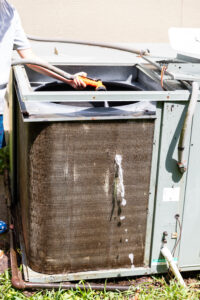
When it comes to keeping your home cool and comfortable during hot summer months, your air conditioner is a dependable ally. But did you know that one of its most vital components, the condenser coil, requires regular cleaning to maintain peak performance? In this article, we’ll delve into the importance of condenser coil cleaning, why it matters, and how you can tackle this essential task.
Understanding the Condenser Coil
The condenser coil is a critical part of your air conditioning system, located in the outdoor unit (also known as the condenser unit). Its primary function is to release the heat absorbed by the evaporator coil inside your home. In simple terms, it takes the heat from indoors and expels it outside, allowing your indoor space to stay cool and comfortable.
Why Condenser Coil Cleaning Matters
The condenser coil plays a pivotal role in maintaining your AC system’s efficiency and performance. Over time, dirt, dust, debris, leaves, and other airborne particles can accumulate on the coil’s surface. This accumulation creates a layer of insulation that hinders the coil’s ability to release heat effectively. Consequently, several issues can arise when the condenser coil isn’t regularly cleaned:
Reduced Cooling Efficiency: A dirty condenser coil forces your AC unit to work harder to cool your home, resulting in decreased energy efficiency and higher utility bills.
Shortened Lifespan: The increased workload on your AC compressor, caused by a dirty condenser coil, can lead to premature wear and tear, potentially shortening the lifespan of your cooling system.
Increased Maintenance Costs: Neglecting condenser coil cleaning can lead to more frequent breakdowns and costly repairs. A well-maintained coil can significantly reduce these expenses.
When to Clean the Condenser Coil
The frequency of condenser coil cleaning depends on various factors, including your location, the surrounding environment, and how often you use your air conditioner. As a general guideline, it’s recommended to have your condenser coil cleaned at least once a year. However, in areas with high pollen, dust, or pollution levels, or if your unit is exposed to debris from nearby trees, more frequent cleaning may be necessary.
How to Clean the Condenser Coil
Cleaning the condenser coil is a task that’s typically best left to HVAC professionals due to the technical nature of the job and the need for specialized equipment. However, if you’re comfortable with DIY maintenance and have some HVAC knowledge, here’s a basic guide:
Safety First: Turn off the power to your AC unit to ensure your safety while working.
Access the Condenser Unit: Remove the access panel or cover to reach the condenser coil.
Inspect and Remove Debris: Examine the coil for debris, leaves, and dirt. Use a soft brush or a vacuum cleaner with a brush attachment to gently remove loose particles.
Apply Cleaning Solution: If you decide to clean the coil yourself, use a commercial coil cleaning solution designed for HVAC systems. Follow the manufacturer’s instructions for proper application.
Rinse Thoroughly: After applying the cleaning solution, rinse the coil thoroughly with a garden hose. Ensure that the water flows through the coil’s fins in the opposite direction of normal airflow, which helps remove dirt and debris.
Reassemble and Restore Power: Once the coil is clean and dry, reassemble the unit and restore power.
Professional Inspection: Consider having a professional HVAC technician inspect your AC system after DIY cleaning to ensure everything is functioning correctly.
In conclusion, condenser coil cleaning is a crucial maintenance task for keeping your air conditioning system running efficiently and extending its lifespan. Neglecting this essential chore can lead to higher energy bills, increased repair costs, and reduced cooling performance. By regularly cleaning the condenser coil, you’ll not only enjoy a more comfortable home but also save money in the long run. So, make condenser coil cleaning a part of your routine HVAC maintenance to ensure your cooling system performs at its best. Lets Swift Air take care of your coil cleanings!

